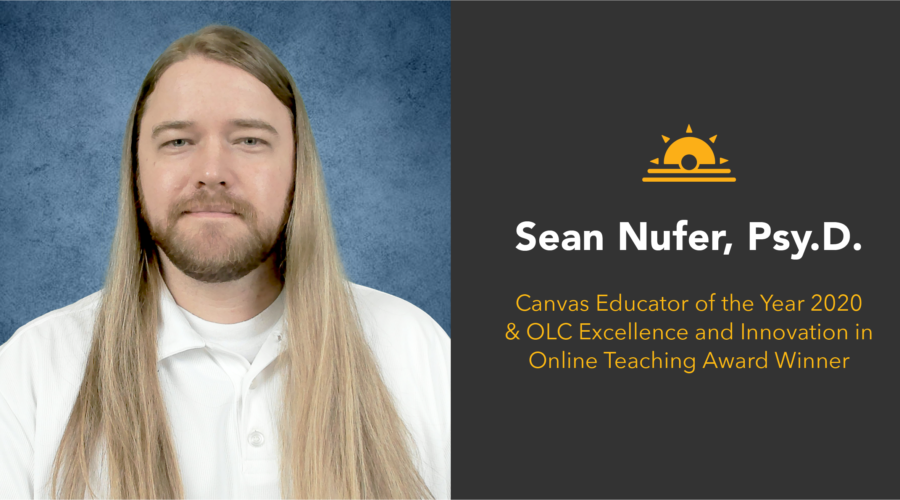TCS leaders are trailblazers in their fields
TCS Education System is a premier force in higher education, led by experts in every department. It is no surprise that the industries they work in take notice. Sean Nufer, Psy.D., the TCS director of teaching and learning, was honored as one of three of Instructure’s Canvas Educator of the Year Awards and the Online Learning Consortium award for excellence and innovation in online teaching for his work as an instructor at The Chicago School of Professional Psychology and Pacific Oaks College.
Dr. Nufer started his instructional design journey at the Academic Support Center at The Chicago School, creating online training modules and videos for students. After collaborating with TCS on these projects, he joined our team as a full-time instructional designer. Moving from instructional design, he became an e-learning specialist before establishing and directing the Department of Educational Technology. He is now the director of the new Office for Teaching and Learning for TCS, which designs and develops interactive resources to train and refine the skills of our partner college faculty.
Inspired by many great professors throughout his higher education journey, Dr. Nufer always felt the call to teach. After designing and developing many classes for TCS partner institutions, he became an adjunct professor—teaching at the bachelor’s, master’s, and doctoral level for four programs at two colleges—all online.
“The great leadership at the institutions where I have taught, The Chicago School and Pacific Oaks, has allowed me to be creative and adventurous with my approach to online teaching,” Dr. Nufer says. “I have taken many risks and tried a few cavalier approaches to teaching, and I always seek my students’ feedback and analysis of my avant-garde tactics. I believe students are partners in education with me, and I depend on them to guide our exploration of the course content.
“If they don’t give up, then I don’t give up on them. If they can make it through my class and make it through their graduate program, then they can conquer life.”
This collaborative approach and a forward-thinking vision in regard to online learning have greatly influenced his teaching style and made him stand apart from other educators. Believing that every class can be taught online, he reiterates that this does not mean “that every class that is online is a good class.” But the tools, techniques, and strategies exist so that every class can become an online class.
TCS has seen this time and time again—from Saybrook University leading the way with distance learning for 50 years, to The Santa Barbara & Ventura Colleges of Law innovative Hybrid J.D. program, online education is an asset, not an inhibitor.
“Students often seek online courses and online programs simply because they need a tremendous amount of flexibility to pursue their education. Remote learning accommodates busy schedules and demanding responsibilities. I have found that online students often are not digital natives or technophiles, but they are tenacious. When we provide sufficient guidance, explanation, and sometimes a shoulder to cry on, they can benefit tremendously from online curriculum,” Dr. Nufer says.
With the instructional design team developing and revising more than 200 courses in the last quarter to make them more accessible for online learning, the pandemic has pushed remote education into overdrive. Dr. Nufer reiterates the importance of community during this time—above all else.
“The pandemic has changed a great many things in higher education. A couple of weeks ago, I was sitting on a panel, discussing recent research and practices, and a general consensus is that educators this year are also therapists. We all have needed to become more flexible, accommodating, understanding, and compassionate to our students,” Dr. Nufer says. “While we cannot compromise the measure of outcomes and alignment of our curriculum, we also cannot approach teaching or learning with a status quo mindset. Even in healthy times, I value my students’ input and regularly solicit their feedback throughout our time together. But continuing to teach and learn during a pandemic is truly a communal endeavor and our students need their professors to be kind leaders in their virtual classrooms.”
You can watch him discuss creating interesting content in Canvas courses here.

